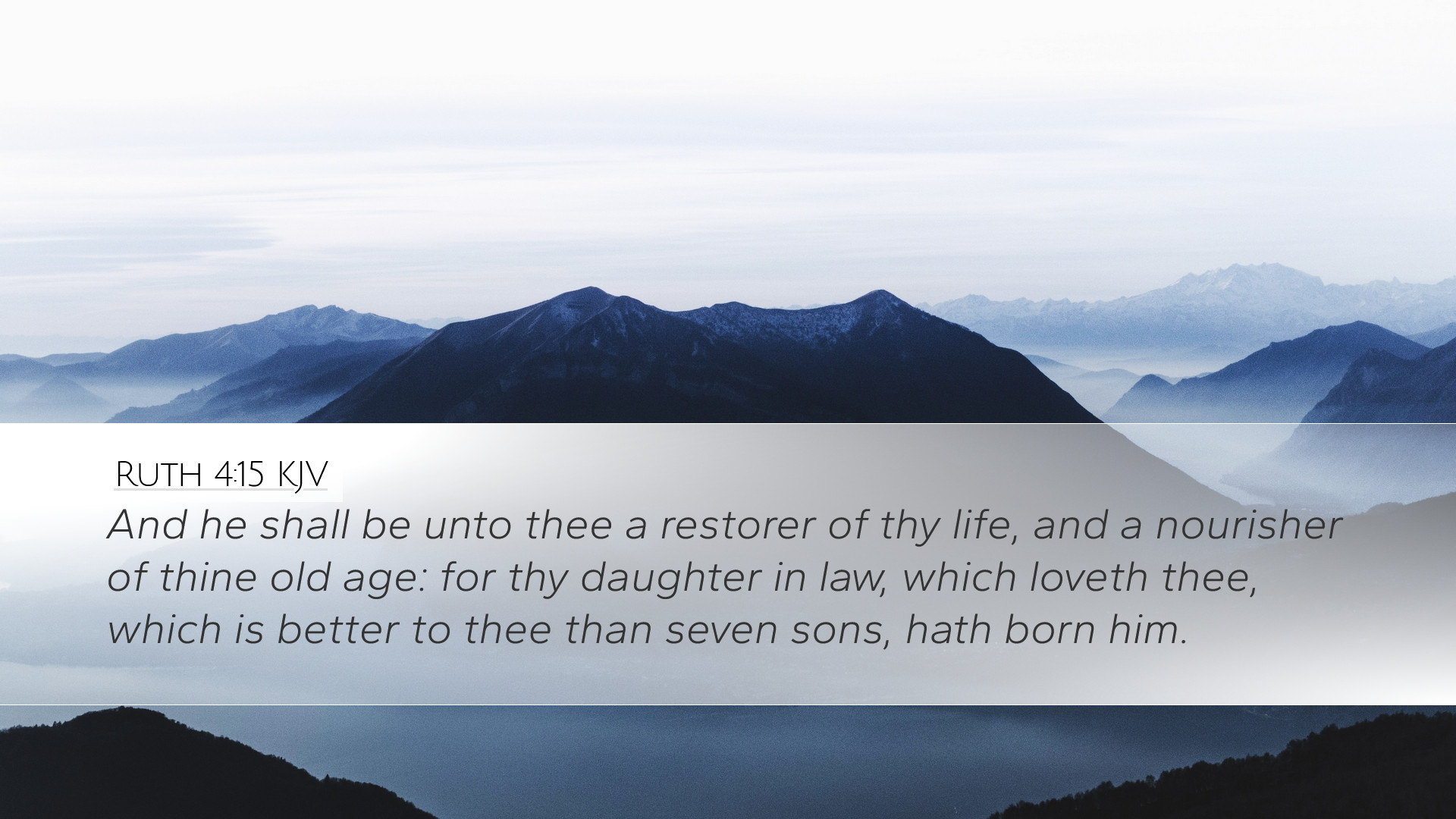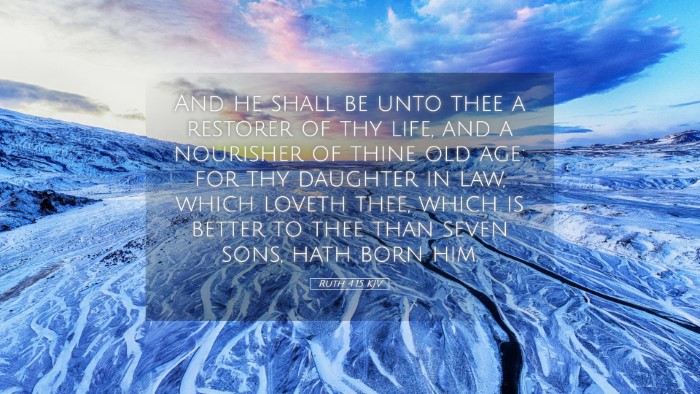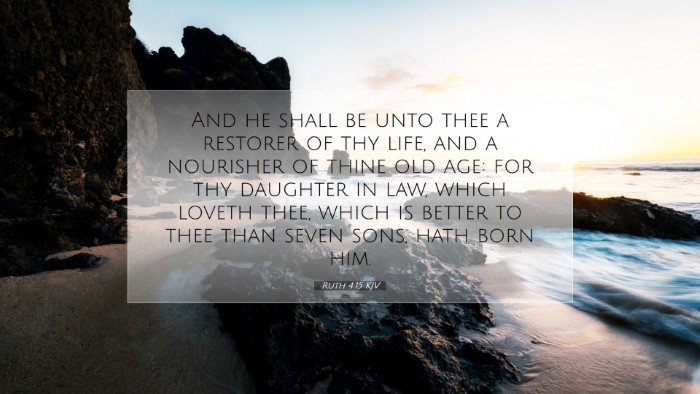Old Testament
Genesis Exodus Leviticus Numbers Deuteronomy Joshua Judges Ruth 1 Samuel 2 Samuel 1 Kings 2 Kings 1 Chronicles 2 Chronicles Ezra Nehemiah Esther Job Psalms Proverbs Ecclesiastes Song of Solomon Isaiah Jeremiah Lamentations Ezekiel Daniel Hosea Joel Amos Obadiah Jonah Micah Nahum Habakkuk Zephaniah Haggai Zechariah MalachiRuth 4:15
Ruth 4:15 KJV
And he shall be unto thee a restorer of thy life, and a nourisher of thine old age: for thy daughter in law, which loveth thee, which is better to thee than seven sons, hath born him.
Ruth 4:15 Bible Commentary
Bible Commentary on Ruth 4:15
Verse: "And he shall be unto thee a restorer of thy life, and a nourisher of thine old age: for thy daughter-in-law, which loveth thee, which is better to thee than seven sons, hath borne him."
Introduction
The Book of Ruth stands as a testament to loyalty, love, and divine providence. As the narrative culminates in Ruth 4:15, we find a profound expression of restoration and blessing, emphasizing the redemptive nature of God’s plans through ordinary lives. This commentary seeks to extract insights from notable public domain biblical scholars, providing a rich examination of this verse for pastors, scholars, and theologians.
Contextual Analysis
Ruth 4 marks the closing of a narrative filled with hardship and divine providence. After a series of trials, Ruth's loyalty to her mother-in-law Naomi leads to significant social and familial restoration through Boaz, a kinsman-redeemer. Understanding the cultural backdrop enhances our perspective on this verse.
- Naomi’s Loss and Restoration: Naomi had faced the death of her husband and sons, leading her to a foreign land with limited hope. Ruth, her Moabite daughter-in-law, demonstrates unwavering commitment and love, which ultimately leads to God's restoration.
- Cultural Significance of Sons: In the ancient Near East, sons were seen as a symbol of security and heritage. The statement about Ruth loving Naomi more than seven sons signifies immeasurable value and loyalty exceeding cultural norms.
Commentary Insights
Matthew Henry's Perspective
Matthew Henry, in his exhaustive commentary, emphasizes the themes of restoration and God's providence. He outlines that the phrase "he shall be unto thee a restorer of thy life" signifies not only the physical sustenance provided by a family member but also spiritual and emotional rejuvenation. Henry posits that God often uses those we least expect to bring blessing into our lives, and Ruth’s loyalty exemplifies how God intertwines lives for his redemptive purposes.
Albert Barnes' Contributions
Albert Barnes elaborates on the significance of Boaz as a "restorer." He points out that the Hebrew term used for "restorer" implies a deep, holistic restoration that goes beyond mere survival. This restoration is mirrored in the community's acceptance and the birth of Obed, who would eventually play a key role in the lineage of David and, by extension, Christ. Barnes emphasizes that Ruth's contribution to Naomi's life and legacy demonstrates that true worth is often found in relationships rather than mere familial lineage.
Adam Clarke's Observations
Adam Clarke provides a linguistically rich interpretation, noting that the word translated as "nourisher" has connotations of support and sustenance. He highlights that this support is particularly poignant in old age, where companionship and care are crucial. Clarke also draws upon the comparison of Ruth to seven sons, reflecting the abundant grace of God that far surpasses mere human expectations. Clarke aptly articulates that the love and dedication manifested by Ruth are exemplars of divine love, which fulfills and far exceeds natural expectations.
Theological Implications
The verse offers rich theological insights relevant for both personal faith and communal living:
- Divine Providence: This text underscores the belief in God’s active role in the lives of His people, suggesting that He orchestrates events for their ultimate good.
- The Value of Relationships: The bond between Ruth and Naomi challenges societal norms, indicating that love and loyalty can offer profound restoration, echoing the heart of the Gospel.
- Legacy of Redemption: Obed’s birth signifies the continuation of God’s redemptive history; thus, every act of loyalty and kindness has eternal significance in God’s plan.
Applications for Ministry and Scholarship
This verse holds practical implications for ministers and scholars alike:
- Encouragement in Ministry: Pastors can draw from Ruth's story to inspire congregations on the importance of loyalty, both to God and community, as a means of restoration.
- Student Reflection: Students of theology can explore themes of kinship and redemption to deepen their understanding of God's workings through human relationships.
- Scholarly Exploration: Scholars may engage in comparative analyses of familial loyalty in biblical texts and contemporary society, providing insights into cultural expectations and divine narratives.
Conclusion
Ruth 4:15 serves as a remarkable testament to the interplay of human loyalty and divine providence. The insights offered by Matthew Henry, Albert Barnes, and Adam Clarke remind us of the profound ways our lives are intertwined within God’s overarching plan of redemption. As we ponder this verse, may we find encouragement in our relationships, recognizing that through acts of love and fidelity, we reflect God’s character and participate in His restorative work in the world.


